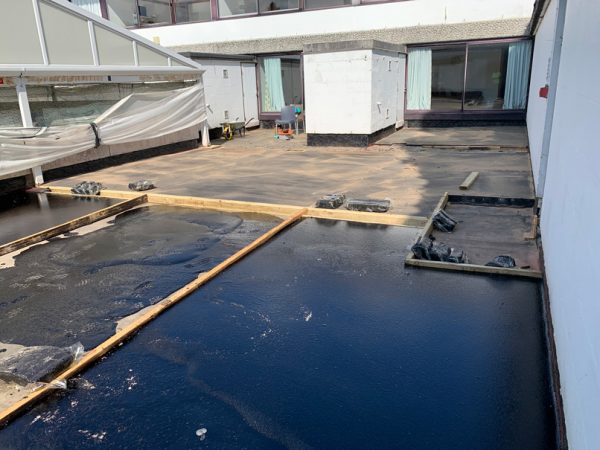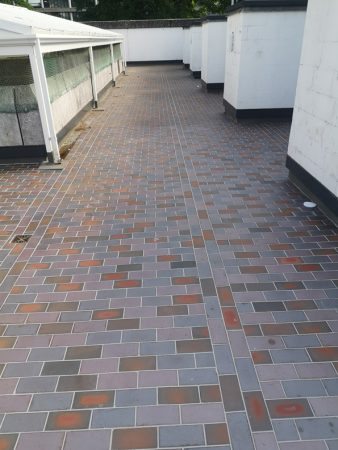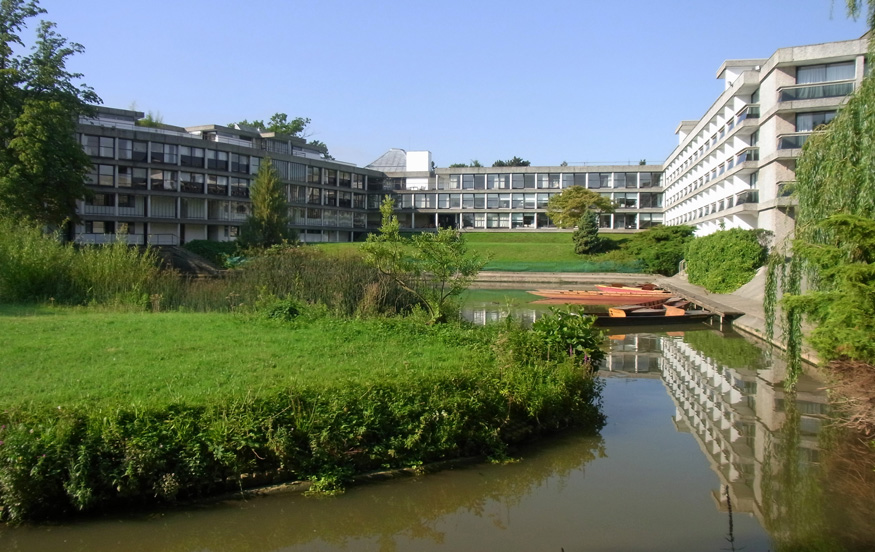Founded in the 1960’s, Wolfson College is one of the University of Oxford’s largest graduate colleges located in the north of the historic city. Named in honour of Sir Isaac Wolfson who contributed to the college’s foundation, the college buildings were designed by architects Powell and Moya and were ready for occupation in 1974.
 Overlooking the River Cherwell, the college has three Modernist quadrangles and was awarded Grade II-listed status in 2011. Over the last few years, the college had experienced problematic leaking within the building that could have impacted on many of the rooms underneath that form the core of the establishment. These include the boiler house, workshops, nurseries, the car park and also the main switch room which controls the entire college.
Overlooking the River Cherwell, the college has three Modernist quadrangles and was awarded Grade II-listed status in 2011. Over the last few years, the college had experienced problematic leaking within the building that could have impacted on many of the rooms underneath that form the core of the establishment. These include the boiler house, workshops, nurseries, the car park and also the main switch room which controls the entire college.
Mastic Asphalt Council (MAC) member Oxford Asphalt has maintained the college roofs for many years and has a long-standing relationship with the maintenance team at Wolfson College. The maintenance team sought further advice from Oxford Asphalt and a site visit was arranged with MAC Director Malcolm Grinstead, roofing manufacturer IKO and Oxford Asphalt to carry out investigations and devise a suitable waterproofing solution.
The roof area in question had originally been protected with a quarry tile finish, so due to the building’s Grade II listing, it was important that this was preserved in order to suit English Heritage’s stipulation.
Furthermore, sustainability was a key element of this refurbishment project as the team at Wolfson College is striving to achieve a zero carbon estate by 2024, which marks the 50th anniversary of the opening of the college building. If this is achieved, it will make Wolfson College the first zero emissions higher education establishment in the UK.
With the government setting a target of net zero carbon emissions by 2050, procuring sustainable building and refurbishment materials has become more important than ever before.
The UK mastic asphalt sector became the first industry in the world to achieve the CarbonZero standard back in 2008. To achieve CarbonZero status, the mastic asphalt industry is effectively taxing itself in the interests of the environment. Individual companies have taken this route before but at the time, this was a world first for an entire industry.
Following the inspection at Wolfson College and further research, a specification was prepared, and Oxford Asphalt undertook the works to strip the tarmac, strip the quarry tiles and remove the reinforced concrete screed which was up to 180mm deep in places down to the concrete roof slab so the whole roof area could be started again from slab up. A bituminous membrane was then applied on a coat of primer for a temporary waterproofing which then had IKO Permascreed built up in layers to create minimum falls of 1: 80 to the existing gully outlets.
 IKO Permascreed is a super-strong, rapid-setting mastic asphalt waterproofing solution. It allows roofs and decks to be trafficked much sooner than traditional cement screeds and eliminates the potential for standing water, which was crucial for this project as the tile finish would not have worked if any standing water was present during the installation.
IKO Permascreed is a super-strong, rapid-setting mastic asphalt waterproofing solution. It allows roofs and decks to be trafficked much sooner than traditional cement screeds and eliminates the potential for standing water, which was crucial for this project as the tile finish would not have worked if any standing water was present during the installation.
IKO’s Polimar FCS liquid applied waterproofing was used over the mastic asphalt Permascreed due to height restrictions at perimeter details and to allow the quarry tile finish to be backed by a guarantee. As the upstands were uneven, IKO Permaphalt mastic asphalt was applied on EML to create an even surface for the IKO Polimar to be installed over to give an aesthetically pleasing finished appearance.
IKO Permaphalt is a specially formulated mastic asphalt solution for waterproofing that uses advanced polymer technology to provide long term durability, increased fatigue resistance, improved temperature stability and ease of installation.
Mastic asphalt is manufactured in the UK and when laid to a 25mm thickness, as manufactured by MAC’s manufacturing members, it achieves a reaction to fire classification of Bfl-S1 when tested in accordance with EN 13501-1:2018.
The mastic asphalt refurbishment has reinstated the waterproofing on the college building, ensuring the underlying rooms are not at risk of water penetration for many years.
This article featured within the March 2023 edition of RCi magazine – click here to view the article.

